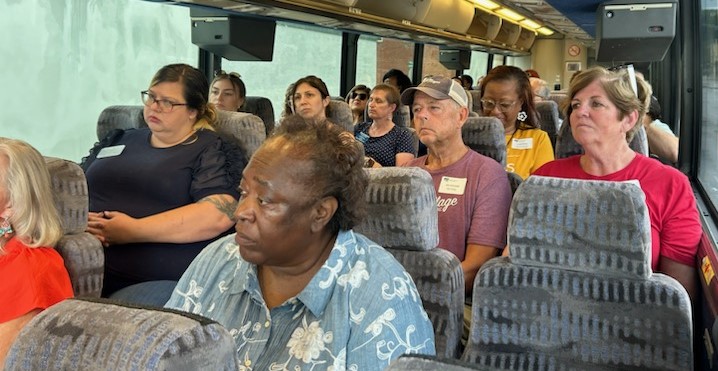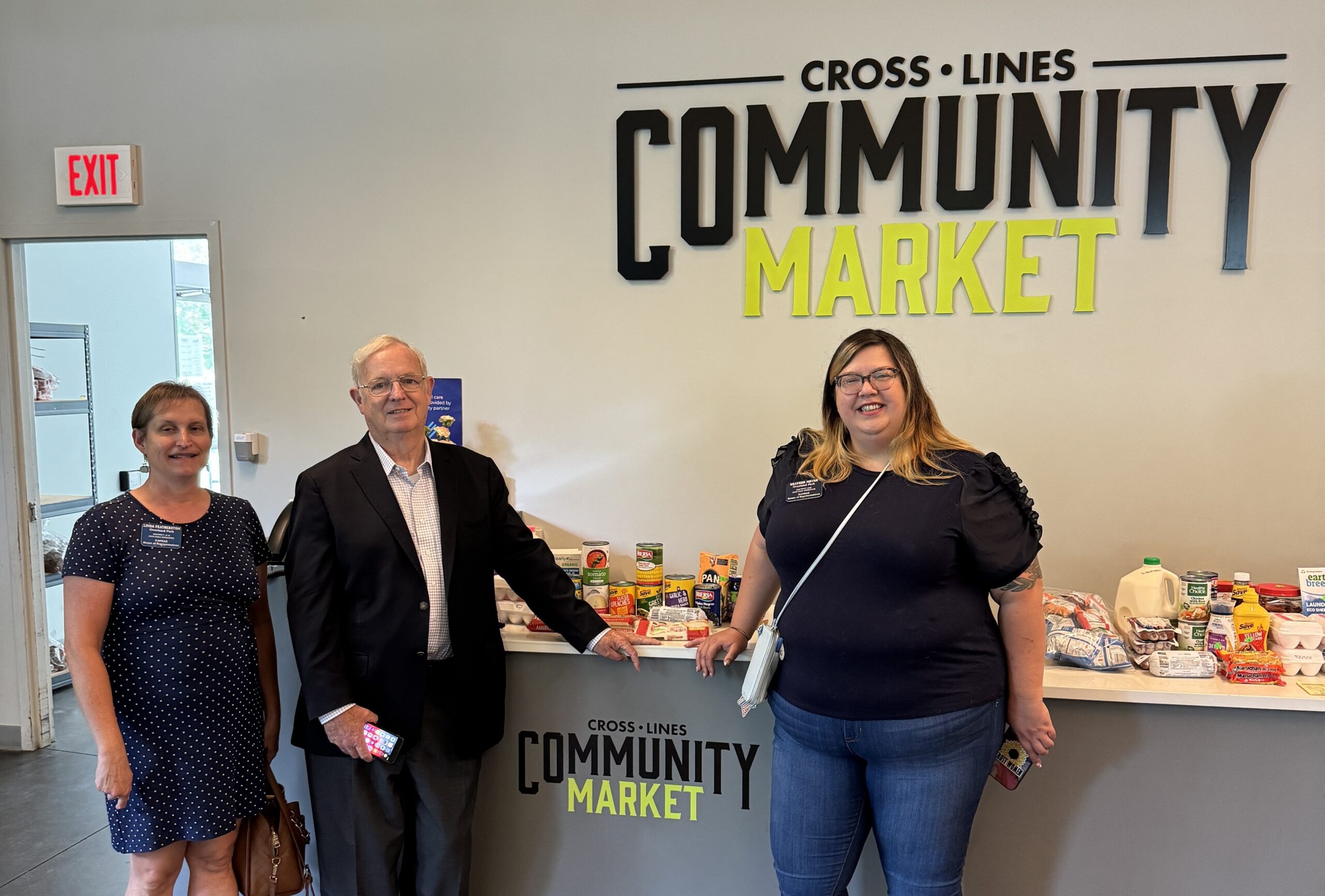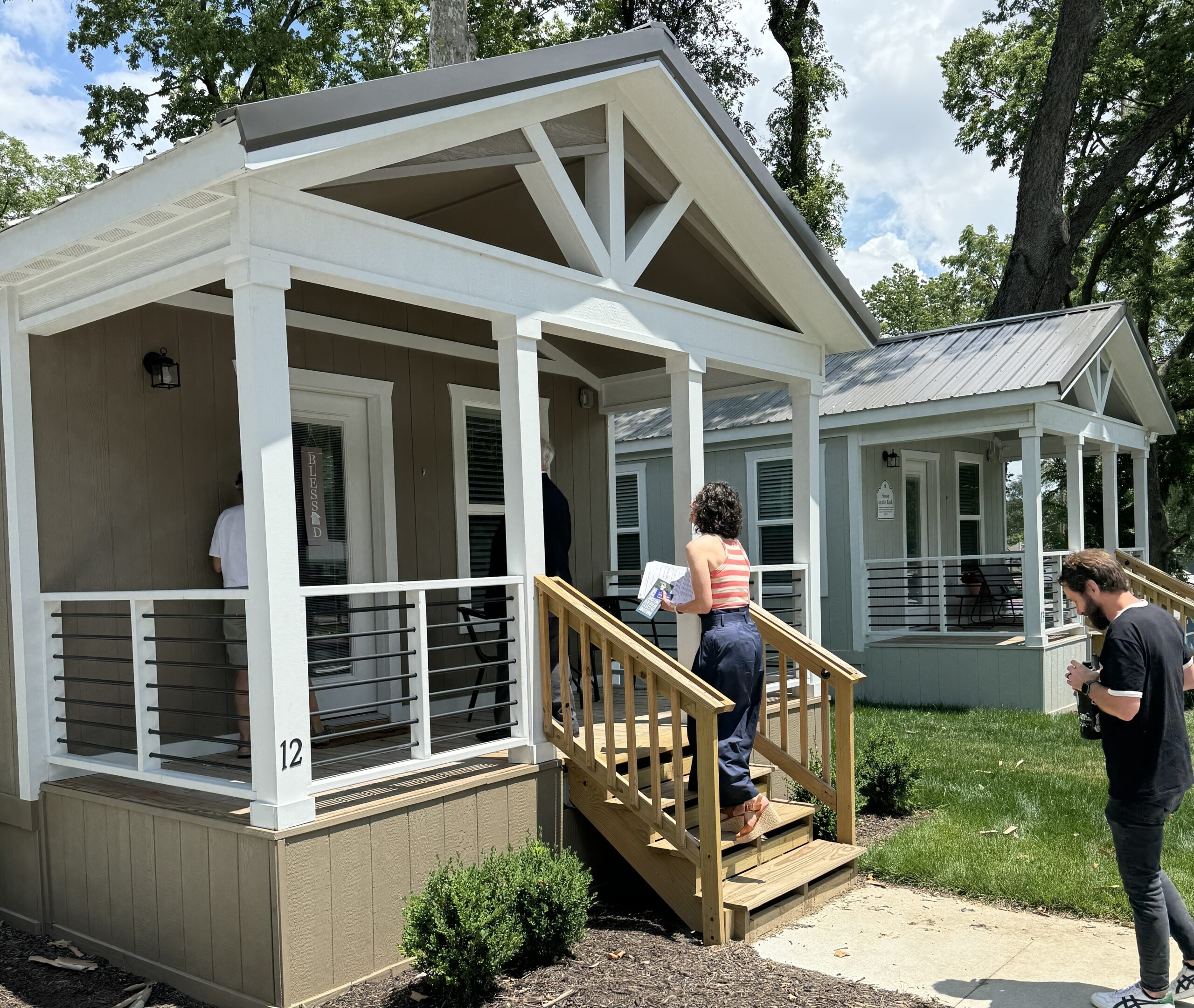Elected Official Bus Tour Lunch & Learn of the Wyandotte County Housing Services Ecosystem

In partnership with UCS and the Kansas Statewide Homeless Coalition (KSHC), the Kansas Housing Advocacy Network (KHAN) hosted a Bus Tour Lunch & Learn of the Wyandotte County Housing Services Ecosystem for elected officials on Friday, June 21st. State legislators, candidates for office, and representatives of the Unified Government, its police department, and school system made for a packed room.
Over lunch, Christina Ashie Guidry, Director of Policy & Planning at UCS, used data to illustrate skyrocketing housing prices, inflation, and stagnant income which have led to all Wyandotte County (WyCo) residents feeling the effects of its housing shortage. Housing is unaffordable for about 40% of WyCo renters and 30% of homeowners, which is pushing an increasing number of WyCo residents, like retirees on fixed incomes, into homelessness. For WyCo to achieve sustainable economic growth, it must have safe, abundant housing options for its workers.
Attendees boarded a charter bus to witness WyCo’s housing services ecosystem themselves. Jessica Smith of KCKPS discussed services for approximately 700 local students at-risk of or experiencing homelessness. Anna McCune of Avenue of Life explained that need has surged since the pandemic with twice as many families needing assistance each month. Why? The housing affordability crisis in Wyandotte County has made it virtually impossible for families to find and maintain affordable housing. While Avenue of Life serves all kinds of families, they see an increase in professionals like nurses and teachers experiencing homelessness because of housing costs.
 At Cross-Lines, attendees toured the Market, a grocery store providing free groceries. Cross-Lines shared a similar narrative: resident demand for its Market has more than doubled since the pandemic, and due to limited funding, Cross-Lines has had to limit households to shopping once every 60 days. Cross-Lines case management staff have supported 250 WyCo residents experiencing homelessness so far in 2024.
At Cross-Lines, attendees toured the Market, a grocery store providing free groceries. Cross-Lines shared a similar narrative: resident demand for its Market has more than doubled since the pandemic, and due to limited funding, Cross-Lines has had to limit households to shopping once every 60 days. Cross-Lines case management staff have supported 250 WyCo residents experiencing homelessness so far in 2024.
Master Sergeant Joyce, KCK Police Department (KCKPD), has decades of policing experience in KCK and leads the KCKPD homelessness response. Her experience has shown that attempting to address homelessness by moving people along or ticketing or arresting them made the problem worse and was expensive for taxpayers. After studying responses across the U.S., she developed KCKPD’s response: police work closely with service providers to connect households experiencing homelessness with the services and housing supports they need to stabilize.
 Attendees’ final stop was Eden Village Tiny Homes, a new initiative in WyCo that will provide permanent affordable housing to formerly chronically homeless residents with support staff on-site. Twenty-three tiny homes, beautifully appointed with one bedroom and one bath, with high ceilings and complete kitchen and living areas, will serve 23 individuals. The tiny homes are nestled in a tree-lined neighborhood with a community garden and resource center. Program applications are closed – with a waitlist several times the program’s capacity. The directors, Jim and Jen Schmidt, shared that there is a critical need for additional affordable housing options in the area.
Attendees’ final stop was Eden Village Tiny Homes, a new initiative in WyCo that will provide permanent affordable housing to formerly chronically homeless residents with support staff on-site. Twenty-three tiny homes, beautifully appointed with one bedroom and one bath, with high ceilings and complete kitchen and living areas, will serve 23 individuals. The tiny homes are nestled in a tree-lined neighborhood with a community garden and resource center. Program applications are closed – with a waitlist several times the program’s capacity. The directors, Jim and Jen Schmidt, shared that there is a critical need for additional affordable housing options in the area.
Back on the bus, Megan Painter of Community Housing of Wyandotte County (CHCW) highlighted the affordable in-fill housing and real estate development supported by CHCW. Housing construction costs have created additional pressure – representing about a 50% increase in housing costs in the past four years. Additional federal, state, and local government supports are necessary to ensure housing affordability and strong community – such as through community land trust and HOME dollars.
Rachel Erpelding of the Wyandot Behavioral Network (WBN) wrapped up the tour as the bus drove by the Frank Williams Outreach Center at Kim Wilson Housing and discussed transitional housing with mental and behavioral health supports. WBN provides transitional housing with wrap around supports for community residents needing intensive supports for less than $15,000/year; meanwhile, the cost of using law enforcement to move individuals along without connecting them to needed services costs an estimated $35,578/year per person in law enforcement, emergency response, and hospital costs.
Policy recommendations to close the gaps in WyCo’s housing continuum and support thriving community concluded the event. While WyCo has a robust set of partners working creatively to address homelessness and housing insecurity, there are significant gaps, including: a low-barrier year round shelter response that connects residents to affordable housing, adequate investment in housing maintenance and retention services like minor home repair and rental assistance, investment in additional transitional housing and wrap around services to support households with more intensive needs, and supporting more abundant affordable housing options. You can view the informational handout here.
For more information, contact Christina Ashie Guidry at christinag@ucsjoco.org.
UCS Statement on the Supreme Court of the United States’ Opinion in Johnson vs. Grants Pass
UCS is proud to be part of Johnson County’s work to end homelessness. On Friday, June 28th, the Supreme Court issued its ruling in Johnson vs. Grants Pass deciding that cities can ticket or arrest people for falling asleep outside when they don’t have a home to go to. This is a particularly cruel decision when Kansas, like other states, has an acute affordable housing shortage as documented by its 2021 Housing Needs Assessment.
The Supreme Court can’t solve homelessness, but working together, our community can. Each of us has a role to play to end homelessness and support thriving community. Providing housing supports and services ends homelessness. Ticketing or arresting individuals for sleeping outside or in a vehicle when they are experiencing homelessness may be legal, but it makes homelessness worse and is very expensive for law enforcement, jails, and taxpayers. It creates a vicious cycle of tickets, fines, arrests, and jail time in which the individual being punished loses her possessions, her vehicle to impoundment, her job due to absences, and is burdened with a new criminal conviction, court and ticket costs, and then released back into homelessness.
Research shows that ticketing or arresting individuals experiencing homelessness is very expensive: it costs taxpayers about $35,578/year per person experiencing homelessness in law enforcement, emergency services, and hospital costs. To provide that same individual transitional housing with wrap around services, including case management, mental and behavioral health supports, employment and other supports costs less than $15,000/year per person delivered in our area.
Right now, in Johnson County, public and private, nonprofit, and faith-based partners are working together on productive solutions – providing the housing with supportive services that end homelessness. One initiative in the works is a new Homeless Services Center which will provide transitional housing and wrap around services to ensure our neighbors experiencing homelessness have a safe place to live and sleep while they move toward self-sufficiency and stability. Local residents can support this effort to keep individuals experiencing homelessness housed and stable by sharing their support directly with local and state elected officials and with friends and neighbors. If you’d like to learn more or connect to support work that increases housing security and ends homelessness, reach out to christinag@ucsjoco.org or kristyb@ucsjoco.org.
